Module 2 Experiences模块导学
文档属性
| 名称 | Module 2 Experiences模块导学 | 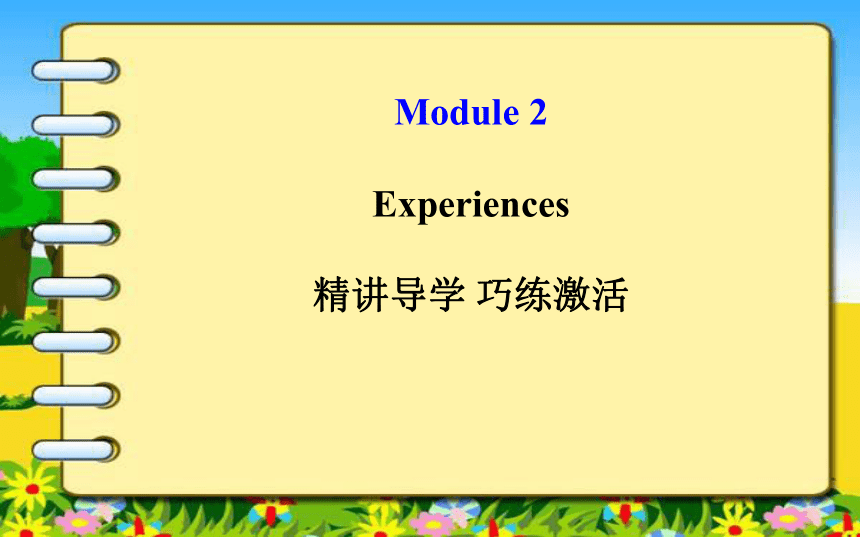 | |
| 格式 | zip | ||
| 文件大小 | 4.5MB | ||
| 资源类型 | 教案 | ||
| 版本资源 | 外研版 | ||
| 科目 | 英语 | ||
| 更新时间 | 2015-03-21 20:00:05 | ||
图片预览

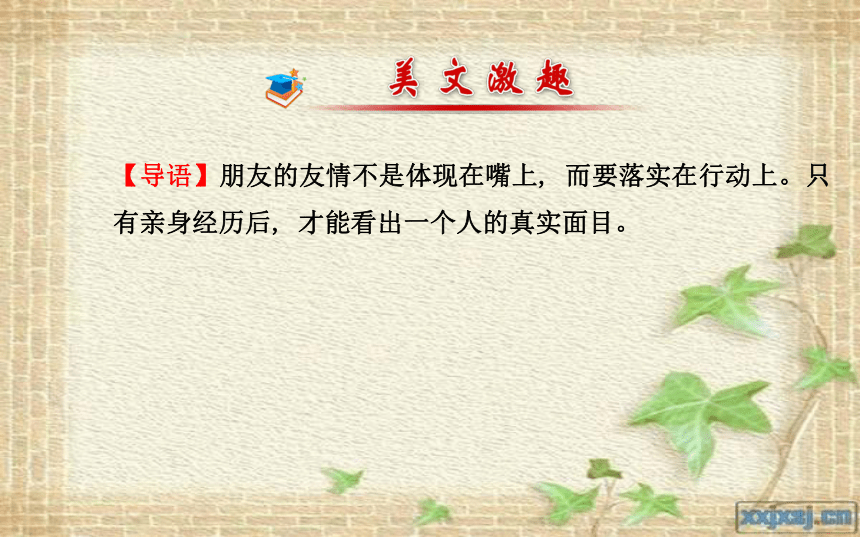
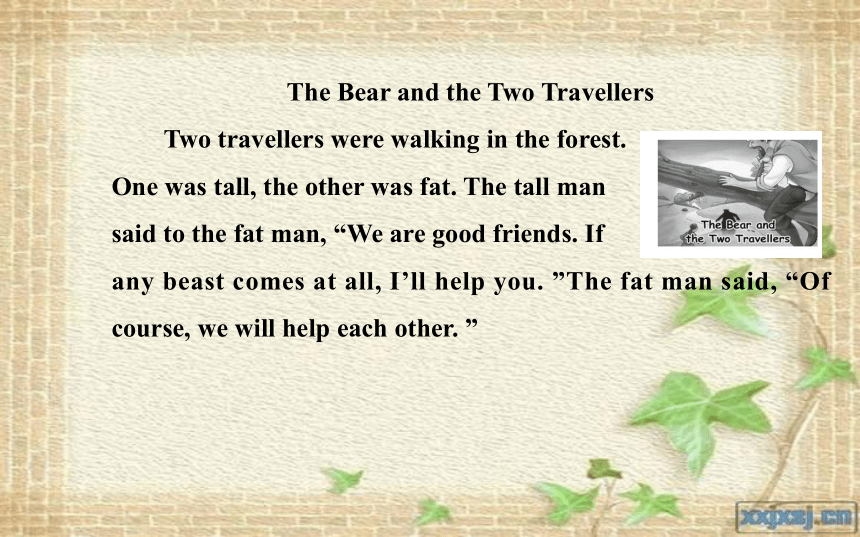
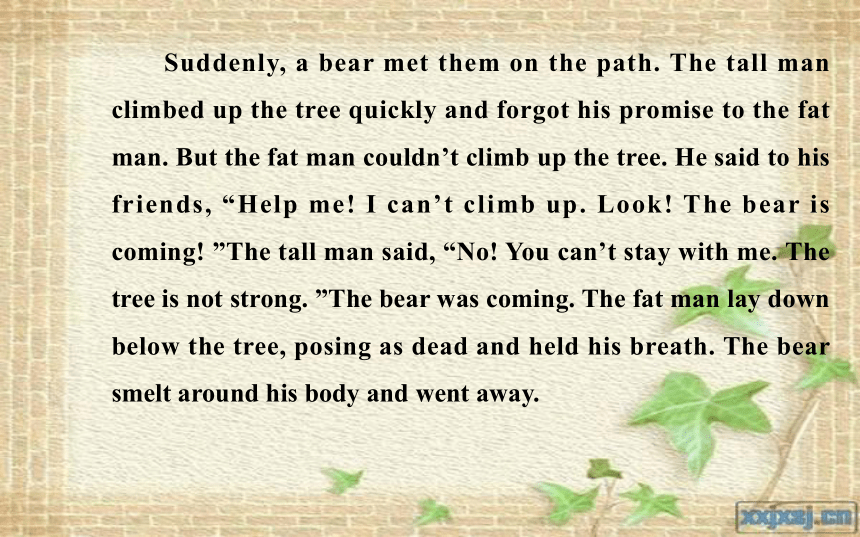
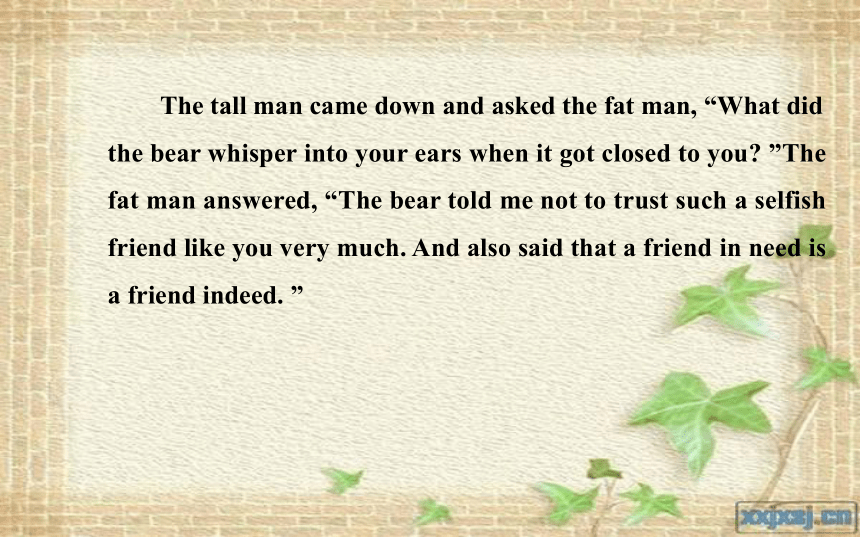
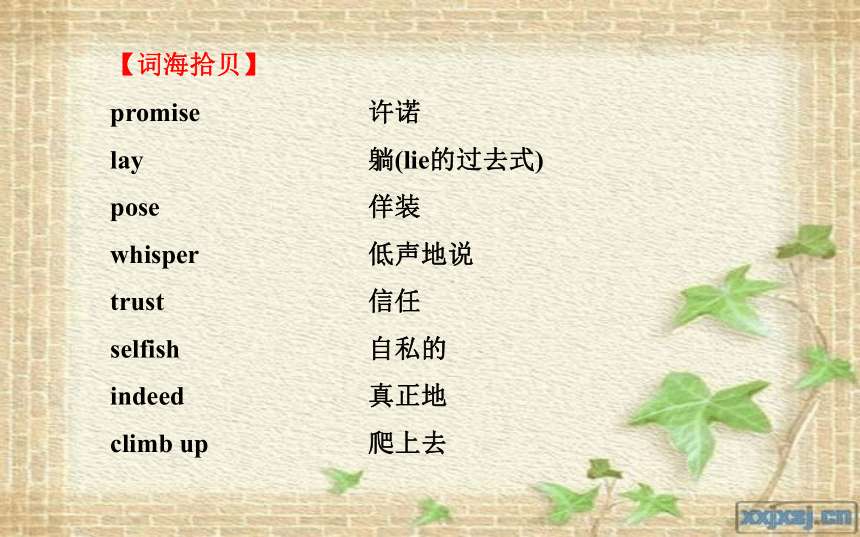
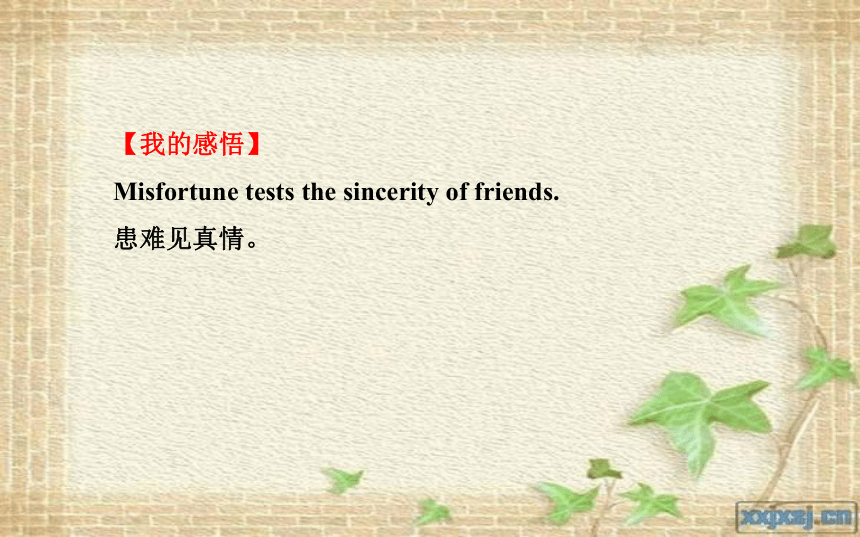
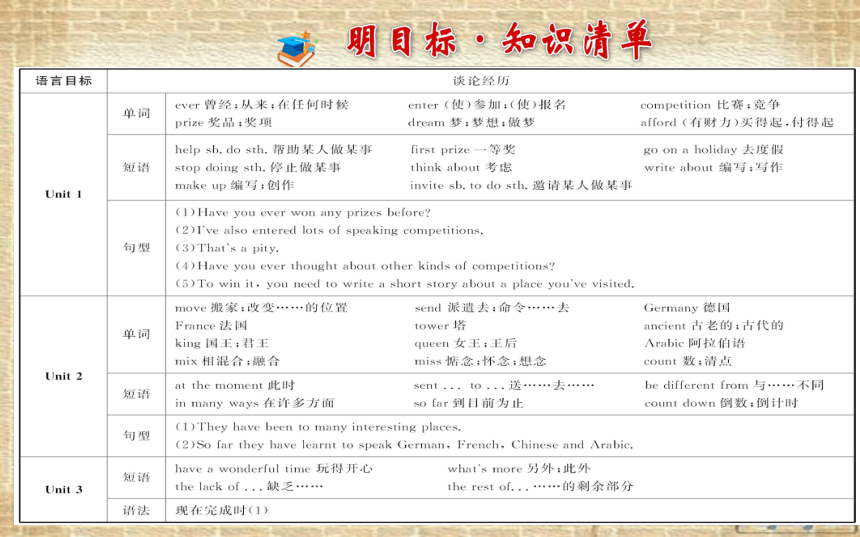
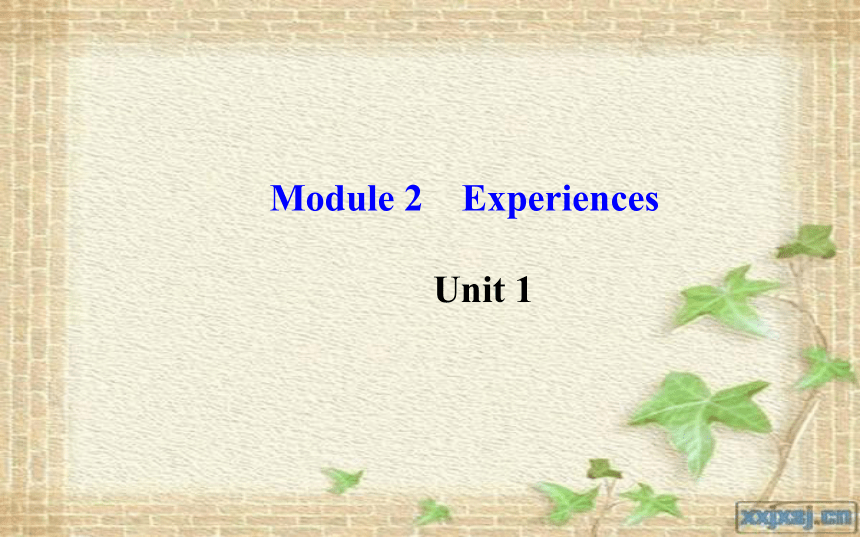
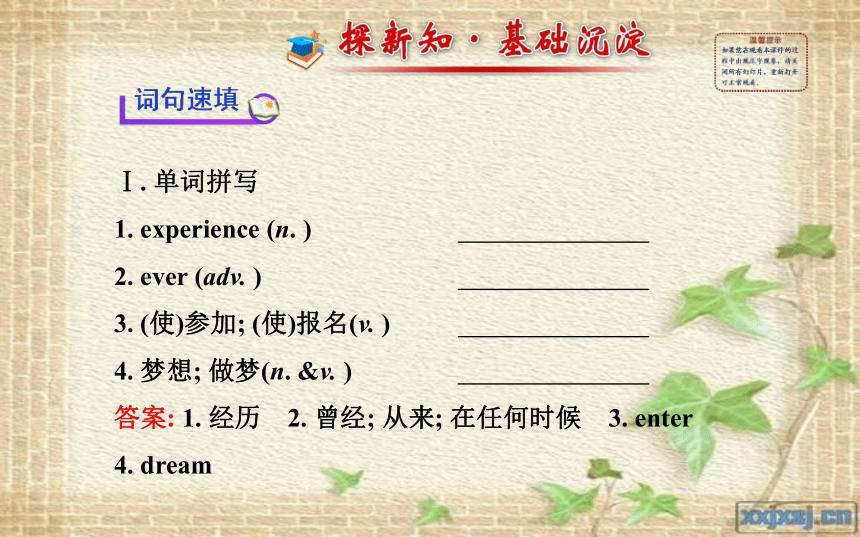
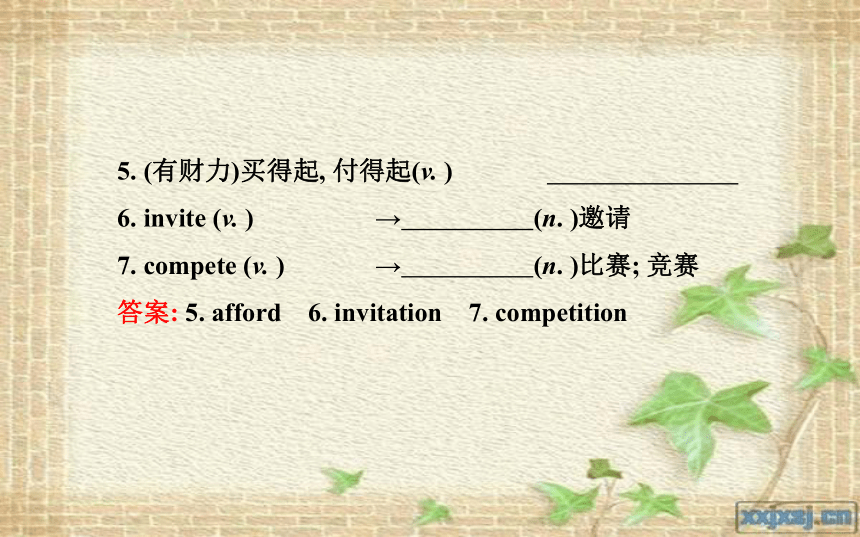
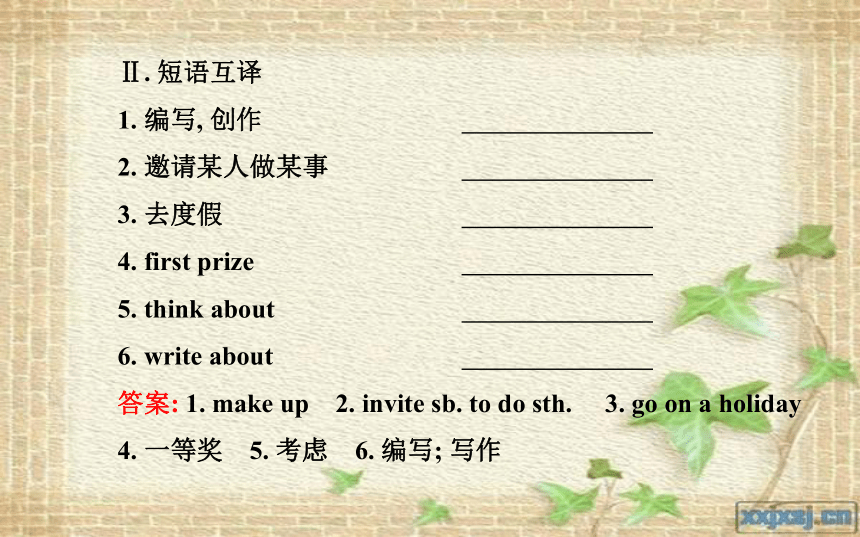
文档简介
课件108张PPT。Module 2
Experiences
精讲导学 巧练激活【导语】朋友的友情不是体现在嘴上, 而要落实在行动上。只有亲身经历后, 才能看出一个人的真实面目。The Bear and the Two Travellers
Two travellers were walking in the forest.
One was tall, the other was fat. The tall man
said to the fat man, “We are good friends. If
any beast comes at all, I’ll help you. ”The fat man said, “Of course, we will help each other. ” Suddenly, a bear met them on the path. The tall man climbed up the tree quickly and forgot his promise to the fat man. But the fat man couldn’t climb up the tree. He said to his friends, “Help me! I can’t climb up. Look! The bear is coming! ”The tall man said, “No! You can’t stay with me. The tree is not strong. ”The bear was coming. The fat man lay down below the tree, posing as dead and held his breath. The bear smelt around his body and went away. The tall man came down and asked the fat man, “What did the bear whisper into your ears when it got closed to you? ”The fat man answered, “The bear told me not to trust such a selfish friend like you very much. And also said that a friend in need is a friend indeed. ”【词海拾贝】
promise 许诺
lay 躺(lie的过去式)
pose 佯装
whisper 低声地说
trust 信任
selfish 自私的
indeed 真正地
climb up 爬上去【我的感悟】
Misfortune tests the sincerity of friends.
患难见真情。Module 2 Experiences
Unit 1 Ⅰ. 单词拼写
1. experience (n. ) ?
2. ever (adv. ) ?
3. (使)参加; (使)报名(v. ) ?
4. 梦想; 做梦(n. &v. ) ?
答案: 1. 经历 2. 曾经; 从来; 在任何时候 3. enter
4. dream 5. (有财力)买得起, 付得起(v. ) ?
6. invite (v. ) → (n. )邀请
7. compete (v. ) → (n. )比赛; 竞赛
答案: 5. afford 6. invitation 7. competitionⅡ. 短语互译
1. 编写, 创作 ?
2. 邀请某人做某事 ?
3. 去度假 ?
4. first prize ?
5. think about ?
6. write about ?
答案: 1. make up 2. invite sb. to do sth. 3. go on a holiday
4. 一等奖 5. 考虑 6. 编写; 写作Ⅲ. 句型填词
1. ——你以前曾经得过奖吗?
——不, 我没有。
—__________ you ever__________ any prizes before?
—No, __________ __________ .
2. 我也参加过许多口语比赛, 但是没获过奖。
I’ve also__________ lots of speaking competitions, but__________ __________ any prizes.
答案: 1. Have; won; I haven’t 2. entered; haven’t won3. 为了赢它, 你需要写一篇有关你参观过的地方的短故事。
__________ __________ it, you need to write a short story about a place__________ __________ .
4. 那听起来很棒, 但是我没去过很多地方。
That__________ wonderful, but I haven’t travelled__________ .
答案: 3. To win; you’ve visited 4. sounds; much①Have you ever won any prizes before?
②I visited the Great Wall two years ago.
______________________________________________
______________________________________________
答案: before意为“以前”, 引导现在完成时句型; ago意为“以前”, “时间段+ago”引导一般过去时。1. dream n. 梦; 梦想; (只用于名词前)梦寐以求的
v. 做梦; 梦到; 梦想
【语境领悟】
*The first prize is“My dream holiday”.
一等奖是“我梦想的假期”。
*Joe had a bad dream last night.
乔昨天晚上做了一个噩梦。【自主领悟】
(1)dream用作名词, 意为“梦; 梦想”; 也可意为“梦寐以求的”, 只用于名词前。my dream watch我梦寐以求的手表。
(2)常构成短语: have a. . . dream“做了一个……的梦”。【归纳拓展】 dream作动词的用法【图解助记】【学以致用】
(2013·乌鲁木齐中考)Tony在这次英语演讲比赛中获得一等奖, 可他从来没梦想过。
Tony got the first prize in the English speech contest this time, but he never__________ __________ it.
答案: dreamed/dreamt of2. afford v. (有财力)买得起; 付得起
【语境领悟】
*But I can’t afford it. 但是我付不起它(假期的费用)。
*The family could not afford to send her to college.
这个家庭无力送她上大学。【自主归纳】afford的用法
afford动词, 意为“买得起; 付得起”, 相当于have enough money to buy/pay for. . . , 后面一般接名词或代词作宾语, 一般用于疑问句或否定句, 常与can, could, be able to等连用。
—What do you think of the 3G mobile phone?
——你认为这部3G手机怎么样?
—I really like it, but I can’t afford it.
——我确实喜欢它, 但是我买不起。【归纳拓展】 afford的相关用法
(1)afford后面可以接动词不定式作宾语, 即afford to do sth. 。
They walked home because they couldn’t afford to take a taxi. 他们因为坐不起计程车而步行回家。
(2)afford后面可以接双宾语, 即afford sb. sth. “为某人提供某物”, 相当于afford sth. for sb. 。
Reading will afford you much pleasure.
阅读会给你提供很多乐趣。【学以致用】
(2014·扬州中考)—Some children can’t afford ______necessary stationery.
—Let’s donate our pocket money to them.
A. buy B. buying C. to buy D. be bought3. To win it, you need to write a short story about a place you’ve visited.
为了赢它, 你需要写一篇有关你参观过的地方的短故事。
【句型剖析】
本句是一个复合句, 动词不定式to win it作目的状语, you’ve visited是定语从句, 修饰先行词a place。【归纳拓展】need的不同用法
(1)need用作实义动词, 意为“需要”, 后面可以接动词不定式, 即need to do sth. “需要做某事”。
What do we need to take for a picnic?
我们需要为野餐带些什么?
(2)need作“需要”讲, 还可以用于以下结构: (3)need还可以用作情态动词, 无人称或数的变化, 后接动词原形, 多用于否定句和疑问句中。例如: You needn’t answer the question. 你没有必要回答这个问题。【学以致用】
①We needn’t water the flowers every day. (改为同义句)
We__________ __________ __________ water the flowers every day.
②—Need we turn off all the lights now?
—__________ , __________ __________ . But you must turn them off when you leave.
答案: ①don’t need to ②No, you needn’t. Ⅰ. 用所给词的适当形式填空
1. Stop__________ (play) football; it’s dangerous on the road.
2. We don’t need__________ (hurry). There’s still some time left.
3. Do you know a famous young writer__________ (call)Guo Jingming.
答案: 1. playing 2. to hurry 3. called 4. We invited the famous writer__________ (give) a speech at the meeting.
5. I often help my grandpa__________ (water) the flowers.
答案: 4. to give 5. (to) waterⅡ. 单项选择
1. —You like the house with a garden very much. Why don’t you buy one?
—Well, but I can’t______it—it’s too expensive.
A. see B. afford C. choose D. provide
2. —Would you like to see the film American Dreams in China(《中国合伙人》)with me?
—I’d love to, but I______it before.
A. saw B. see C. have seen D. didn’t see3. (2014·襄阳中考)—What are you going to do when you grow up?
—My______is to become an astronaut.
A. hobby B. dream C. job D. advice
4. “Tell me the truth. Don’t ______any reasons, ”the mother said angrily.
A. make up B. make into C. make from D. make sure5. —I’ll enter a writing competition next week.
—____?
A. It’s a pity. B. That sounds interesting.
C. Good luck. D. Congratulations. Module 2 Experiences
Unit 2 Ⅰ. 单词拼写
1. tower(n. ) ______________
2. mix(v. ) ______________
3. send(v. ) ______________
4. 改变……的位置(v. ) ______________
5. 方面; 态度(n. ) ______________
答案: 1. 塔 2. 相混合; 融合 3. 派遣去; 命令……去
4. move 5. way 6. 国王(n. ) ______________
7. German (n. & adj. ) →__________ (n. )德国
8. French (n. & adj. ) →__________ (n. )法国
9. Arab (n. ) →__________ (n. )阿拉伯语
10. old (adj. ) →__________ (近义词)古老的; 古代的
答案: 6. king 7. Germany 8. France 9. Arabic
10. ancientⅡ. 短语连线
1. at the moment A. 与……不同
2. send. . . to. . . B. 到目前为止
3. be different from C. 倒数; 倒计时
4. so far D. 送……去……
5. count down E. 此时Ⅲ. 句型填词
1. 现在, 迈克和克莱尔在埃及开罗, 非洲最大、最繁忙的城市
之一。
At the moment, Mike and Clare are in Cairo in Egypt,
__________ __________ __________ __________ and
__________ cities in Africa.
2. 他们和父母两年前搬来这里。
They__________ here__________ their parents two years ago.
答案: 1. one of the biggest; busiest 2. moved; with3. 他们去过许多有趣的地方。
They__________ __________ __________ many interesting places.
4. 这种语言和英语在许多方面不同, 并且他们发现拼写和读这些单词很难。
This language is__________ __________ English in many ways, and they find__________ hard__________ __________ and pronounce the words.
答案: 3. have been to 4. different from; it; to spell5. 到目前为止, 他们学会了讲德语、法语、汉语和阿拉伯语。
__________ __________ they__________ __________ __________ __________ German, French, Chinese and Arabic.
答案: So far; have learnt to speak1. Cairo is one of the biggest and busiest
cities in Africa. ( )
2. Peter has worked in Germany, France and China. ( )
3. The Robinsons have seen the ancient kings and queens. ( )
4. Mike and Clare speak German, French, Chinese very well.
( )
5. The Robinsons come from America. ( )
答案: 1~5. TTFFT1. miss v. 惦念; 怀念; 想念
【语境领悟】
*. . . but they also miss their friends in the US.
但是他们也想念他们美国的朋友。
*Miss Li was sad because she missed her train.
李小姐很伤心, 因为她错过了火车。【自主归纳】【温馨提示】
missing“失去的; 找不到的”。
My math book is missing. 我的数学课本不见了。【学以致用】
(2013·随州中考)昨天, 她没赶上公共汽车, 只好步行回家。
Yesterday she__________ the bus and__________ to walk home.
答案: missed; had2. They have been to many interesting places.
他们去过许多有趣的地方。
【句型剖析】
have been to意为“去过……”, 表示一种经历, 表示过去去过, 人现在已经回来(去已回)。常与ever, just, never等词连用; 其后可接once, twice等表示次数的词。例如: I have been to the Summer Palace many times. 我去过颐和园许多次了。【归纳拓展】
“have gone to”的用法
have gone to表示“已经去了某地(去未回)”, 着重指说话时不在现场, 一般用于第三人称。
Mr. Green isn’t in. He has gone to Shanghai. 格林先生不在家, 他去了上海。【图解助记】【学以致用】
①(2013·盐城中考)你去过盐城科技博物馆多少次了?
_______________Yancheng Science and Technology Museum?
答案: How many times have you been to
②(2014·扬州中考)—Where is Mr. Wang?
—He together with his students ______ Zhuyuwan Park.
A. has gone to B. have gone to
C. has been to D. have been to3. . . . they find it hard to spell and pronounce the words.
……他们发现拼写和读这些单词很难。
【句型剖析】
(1)本句句式结构如下: (2)“find+宾语+形容词”, 在此结构中形容词作宾语补足语, 和前面的宾语构成复合宾语。
We found the boy very clever. 我们发现这个男孩很聪明。【归纳拓展】
“find +复合宾语”的四种不同结构
(1)“find+宾语+名词”。例如: I found it an exciting game. 我发现这是个令人兴奋的游戏。
(2)“find+宾语+v. -ing形式”。例如: We found a number of farmers working there when we passed the field. 我们路过田野的时候, 发现许多农民在那里干活。(3)“find+宾语+介词短语”。例如: When the boy woke up, he found himself in hospital. 当那个男孩醒来时, 他发现自己在医院里。
(4)“find+宾语+动词的过去分词”。例如: The boss found all the work finished when he arrived. 老板到的时候, 他发现所有的工作都做完了。【学以致用】
(2013·宜宾中考)我发现听清楚英语歌词很难。
I find__________ hard to hear the English lyrics__________ .
答案: it; clearlyⅠ. 从方框中选择合适的短语并用其适当形式填空
at the moment; be different from; all over the world;
count down; so far
1. Let’s________________from twenty. Twenty, nineteen, eighteen. . .
2. The new building________________the old one in style.
答案: 1. count down 2. is different from3. ________________no one has known how large the universe is.
4. ________________, people in America are sleeping.
5. The Great Wall attracts visitors________________.
答案: 3. So far 4. At the moment 5. all over the worldⅡ. 单项选择
1. Tony comes from America. He is______boy.
A. eleven year old B. eleven years old
C. an eleven-year-old D. a eleven-year-old
2. We found______relaxing to travel at the weekend.
A. it B. that C. this D. them3. (2013·孝感中考)—I’d like you to tell me something about Shen Nongjia.
—I’m sorry, but neither Jack nor I______there.
A. have been B. had been
C. have gone D. has gone
4. (2014·孝感中考)“Food Safety” has become one of ______ topics recently.
A. hot B. hotter
C. hottest D. the hottest5. —______you already ______ the books to Maria?
—Yes, I have. I sent them to her yesterday.
A. Did; send B. Will; send
C. Do; send D. Have; sentModule 2 Experiences
Unit 3??1. another adj. 另外的; 不同的;
pron. 又一个; 另一个
【语境领悟】
*Have you ever lived in another country?
你曾经在另一个国家居住过吗?
*I don’t want this apple. Please give me another one.
我不想要这个苹果, 请给我另一个。【自主归纳】
another用作形容词, 意为“又一个的; 再一个的”, 泛指三者或三者以上的人或物中的另一个, 后面一般接单数名词。例如: I’m very busy today. Could we play games together another day? 今天我很忙, 我们可以改天一起做游戏吗? 【归纳拓展】 another用法知多少
(1)one after another“一个接一个地”;
(2)one another“彼此; 相互”;
(3)another+基数词+名词(=基数词+more+名词)“另外……个……”。例如: The boy asked his mother to give him another two cakes/two more cakes. 那个男孩让妈妈再给他两个蛋糕。【学以致用】
①—Would you like to have ______coat?
—No, thanks. I’ve had two. That’s enough.
A. other B. others
C. another D. the other
②I’m sorry, I have another three questions to ask you. (找出画线部分的同义词组)
A. more than three B. three other
C. other three D. three more2. the rest of. . . 其余的……; ……的剩余部分
【语境领悟】
*But they remained heroes around the world for the rest of their lives.
但是, 对于全世界来说, 他们的余生仍然是英雄。
*The rest of the eggs have gone bad.
其余的鸡蛋都变质了。【自主归纳】
the rest of. . . 是固定短语, 意为“其余的……; ……的剩余部分”后接名词或代词。【温馨提示】
the rest of后面接名词作主语时, 其谓语动词的形式取决于of后的名词。
Some students are planting trees. The rest of them are watering the trees. 一些学生在植树, 剩余的学生在给树浇水。【学以致用】
There are five questions in the math book. Three of the questions are very difficult, but the rest of them__________ (be) more difficult.
答案: are现在完成时(1)
【观察领悟】仔细观察例句, 说出其肯定句、否定句和疑问句形式的构成。
1. Have you ever won any prizes before?
2. I’ve also entered lots of speaking competitions, but haven’t won any prizes.
3. So far they have learnt to speak German, French, Chinese and Arabic. 【知识构建】
(一)概念
现在完成时表示过去的动作对现在有某种影响, 也可以表示到目前为止已经完成的动作。常与ever(曾经), already(已经)或yet等连用, 其谓语动词的构成为: have/has+过去分词。 (二)基本结构
①肯定句: 主语+have/has+过去分词+其他. 例如: He has turned off the light. 他已经把灯关了。
②否定句: 主语+have/has+not+过去分词+其他. 例如: He hasn’t turned off the light. 他还没有关灯。 ③一般疑问句: Have/Has+主语+过去分词+其他?
例如: Has he turned off the light? 他已经把灯关了吗?
回答: 肯定: Yes, 主语+have/has.
否定: No, 主语+haven’t/hasn’t.
④特殊疑问句: 特殊疑问词+一般疑问句(have/has+主语+过去分词+其他)? 例如: What has he done? 他做了什么? (三)动词过去分词的构成
规则动词的过去分词大部分和其过去式相同, 其构成规则如下: 【学以致用】
单项选择
1. He has ______China twice. He’s visited many interesting places there.
A. been to B. gone to
C. going to D. going to go to
2. You’ve never heard of this new kind of plane, ______you?
A. haven’t B. did C. do D. have3. (2014·昆明中考)—Have you ever seen the TV show Where Are We Going, Dad?
—______. I think it’s quite moving and funny.
A. Yes, I have B. No, I haven’t
C. Yes, he has D. No, she hasn’t
4. So far this year we______a fall in house prices by between 5 and 10 percent.
A. saw B. see
C. had seen D. have seen5. (2013·襄阳中考)—We all went to the cinema except you last night. Why didn’t you come?
—Because I ______ that movie twice.
A. have watched B. had watched
C. was watching D. would watch 假设你是Daming, 请给你在美国的笔友Jackson写一封信, 介绍你的亲身经历。选择你曾经去过的一个地方, 在那里你看到了哪些风景, 吃了什么特色食品, 做了哪些有趣的事情? 请选择一些对你有帮助的英文提示词完成信件。
ever, been, see, taste, drink, delicious, take photos,
interesting, visit, find【思路点拨】
(1)体裁: 记叙文。
(2)人称: 第一人称。
(3)时态: 现在完成时。【写作模板】【妙笔成篇】 ___________________________________________________
___________________________________________________
___________________________________________________【参考范文】
Dear Jackson,
How is everything going with you?
I’ve ever been to Beijing. I went there last summer holiday. I have seen many beautiful places there. And I have eaten a lot of delicious food, such as Beijing Duck, dumplings and snacks. I have also drunk“Doujiang”, and it tasted different. I have visited the Great Wall and the Summer Palace. What’s more, I met some foreigners and I made friends with them. I found it agreat way of learning English to talk with my new friends. It was interesting, and I had a wonderful time. I have found it very useful for us.
Best wishes!
Yours,
DamingⅠ. 单项选择
1. John lives in New York, but his parents live in______big city—Los Angeles.
A. other B. the other C. another D. one
2. —______have you been to Australia?
—Only once.
A. How soon B. How often
C. How long D. How many times3. The little boy is very clever. He can play the piano, and______, he can sing Beijing Opera.
A. for example B. what’s more
C. such as D. however
4. This present isn’t very expensive. I think we can afford ______it.
A. to buy B. buying C. buy D. bought5. —Have you eaten up all the food, kids?
—No. We have eaten most of it. The rest of the food ______in the fridge.
A. are B. is C. have been D. beenⅡ. 完成句子
1. We have known each other for a long time. (改为一般疑问句)
__________ __________ __________ each other for a long time?
2. She has put her book somewhere. (改为否定句)
She__________ put her book__________ .
答案: 1. Have you known 2. hasn’t; anywhere 3. Jim has never seen the film, __________ __________ ? (完成反意疑问句)
4. She came here three years ago. (改为否定句)
She__________ __________ here three years ago.
5. Jane met one of her friends last week. (改为一般疑问句)
__________ Jane__________ one of her friends last week?
答案: 3. has he 4. didn’t come 5. Did; meetⅢ. 补全对话
从方框中选择最佳选项完成对话, 有两项多余。
A. How many places have you been to in China?
B. Where have you been in China?
C. Why?
D. I’ll go there some day again.
E. You didn’t go there in the right season.
F. But I don’t think it’s very nice.
G. Why not? A: Hi, Sam. 1 ?
B: Not too many. I have only been to some
places near Beijing.
A: Have you ever been to Xiangshan?
B: Yes, I have. 2 ?
A: When did you go there?
B: Last summer. I went there with my parents. A: 3 In autumn Xiangshan is the most beautiful.
B: 4 ?
A: Because at that time, all the leaves turn red. The red leaves are brilliant.
B: Really? 5 ?
1. 2. 3. 4. 5. ?
答案: 1~5. AFECDⅣ. 完形填空
Mr. Jackson began his trip last Saturday.
Two days later when he was travelling in the
country 1 , he saw a dog behind a man.
As the car came near them, the dog suddenly
started to 2 the road. Of course the car hit the poor animal and killed it. Mr. Jackson 3 his car and walked to the man. “I’m very 4 that this happened. ”he said. “How much shall I 5 ? Will ten dollars be enough? ”“Oh, yes. ”said the man. “Ten dollars will be 6 enough. ”Mr. Jackson put his hand into his pocket, but he only 7 five dollars in the pocket.
“Sorry, sir, I’ve only 8 five dollars. ”said Mr. Jackson.
“No problem. That’s enough. ”the fat man replied. “Thanks a lot. That’s very kind of you. ”Mr. Jackson thanked the fat man and 9 away. When the car went away, the fat man looked down at the dog and thought. “I want to know 10 dog it is. ”1. A. by bus B. by bike C. by train D. by car
2. A. go B. cross C. run D. jump
3. A. started B. ran C. stopped D. jumped
4. A. happy B. lucky C. sorry D. pleased
5. A. give B. take C. bring D. pay
6. A. quite B. very C. much D. so
7. A. looked for B. looked at C. watched D. found
8. A. seen B. had C. got D. paid
9. A. drove B. ran C. walked D. started
10. A. what B. whose C. which D. where
答案: 1~5. DBCCD 6~10. ADCCBModule 2 Experiences
模块复习课Ⅰ. 词汇速记
1. 曾经; 从来; 在任何时候(adv. ) ______________
2. 梦; 梦想; [只用于名词前]梦寐以求的(n. )
做梦; 梦到; 梦想(v. ) ______________
3. (有财力)买得起; 付得起(v. ) ______________
4. 可惜; 遗憾(n. ) ______________
答案: 1. ever 2. dream 3. afford 4. pity 5. invitation(n. ) →__________ (v. )邀请
6. German(n. &adj. ) →__________ (n. )德国
7. French(n. &adj. ) →__________ (n. )法国
8. Arab(n. ) →__________ (n. )阿拉伯语
9. compete(v. ) →__________ (n. )比赛; 竞争
10. old(adj. ) →__________ (近义词)古老的; 古代的
答案: 5. invite 6. Germany 7. France 8. Arabic
9. competition 10. ancientⅡ. 短语互译
1. 需要做某事 need__________ __________ sth.
2. 去度假 __________ __________ a holiday
3. 编造 make__________
4. 邀请某人做某事 invite sb. __________ __________ sth.
5. 与……不同 be__________ ________
答案: 1. to do 2. go on 3. up 4. to do
5. different from6. 为……而高兴 be__________ ________
7. 倒数; 倒计时 count________
8. 另外; 此外 __________ more
9. think about ________________
10. so far ________________
11. have a wonderful time
________________
答案: 6. happy about 7. down 8. what’s
9. 考虑 10. 到目前为止 11. 玩得开心Ⅲ. 句型攻关
1. ——王萍以前参观过法国吗?
——不, 从来没有!
—__________ Wang Ping__________ France before?
—No, never!
2. 宇航员去过月球, 但是没去过火星。
The astronauts__________ __________ __________ the moon, but they__________ __________ __________ Mars.
答案: 1. Has; visited 2. have been to; haven’t been to3. 做蛋糕, 我们需要鸡蛋、面粉和糖。
__________ __________ a cake, we need eggs, flour and sugar.
4. 我发现帮助别人令人愉快。
I found__________ pleasant__________ __________ others.
5. 温迪去过加拿大几次?
__________ __________ __________ has Wendy been to Canada?
答案: 3. To make 4. it; to help 5. How many timesⅣ. 语法专练
(Ⅰ)写出下列动词的过去式和过去分词
1. visit__________ _________
2. live__________ _________
3. play__________ _________
4. try__________ _________
5. stop__________ _________
答案: 1. visited; visited 2. lived; lived 3. played; played
4. tried; tried 5. stopped; stopped 6. go__________ _________
7. see__________ _________
8. meet__________ __________
9. be__________ _________
10. take__________ _________
答案: 6. went; gone 7. saw; seen 8. met; met
9. was/were; been 10. took; taken(Ⅱ)用所给词的适当形式填空
1. So far that composer__________ already__________ (compose) many songs.
2. —How many times__________ Mr. Black__________ (climb) Mount Huang?
—Twice.
3. We______________ (learn) English since two years ago.
答案: 1. has; composed 2. has; climbed 3. have learnt4. Sally_____________ (see) the Beijing Opera before, so she doesn’t want to see it.
5. I____________ (have) breakfast and I am full.
6. He__________ already__________ (finish) his work.
7. —George, _________ you_________ (watch) the film Titanic?
—Yes, I have. I saw it last week.
答案: 4. has seen 5. have had 6. has; finished
7. have; watchedⅤ. 真题体验
1. (2014·绵阳中考)—Is Richard still living here?
—No, he ______to Paris already.
A. had moved B. moved
C. will move D. has moved
【解析】选D。考查时态。根据already判断, “他已经搬到巴黎了”, 用现在完成时, 故选D。2. (2014·广东中考)—What do you think of the new foreign teacher Thomson?
—Pretty good. I think he______a great job so far.
A. does B. did
C. has done D. was done
【解析】选C。考查时态。so far到目前为止, 用于现在完成时。句意: ——你认为新外语老师汤姆森怎么样? ——很好, 我认为他目前做了一件很好的工作。故选C。3. (2014·安顺中考)—Fred is studying Chinese in one evening school.
—Is that true? He has ______told me about it.
A. ever B. even C. already D. never
【解析】选D。考查词义辨析。句意: ——弗莱德在一所夜校学习汉语。——真的吗? 他从来没告诉过我。never“从不”, 故选D。4. (2014·绥化中考)Mr. Wang isn’t here, I think he______
Shanghai.
A. went B. has been to
C. has gone to
【解析】选C。考查时态。“has gone to”表示去了(还没回来); “has been to”表示去过(已经回来了)。句意: 王先生不在这儿, 我认为他去上海了。故选C。
Experiences
精讲导学 巧练激活【导语】朋友的友情不是体现在嘴上, 而要落实在行动上。只有亲身经历后, 才能看出一个人的真实面目。The Bear and the Two Travellers
Two travellers were walking in the forest.
One was tall, the other was fat. The tall man
said to the fat man, “We are good friends. If
any beast comes at all, I’ll help you. ”The fat man said, “Of course, we will help each other. ” Suddenly, a bear met them on the path. The tall man climbed up the tree quickly and forgot his promise to the fat man. But the fat man couldn’t climb up the tree. He said to his friends, “Help me! I can’t climb up. Look! The bear is coming! ”The tall man said, “No! You can’t stay with me. The tree is not strong. ”The bear was coming. The fat man lay down below the tree, posing as dead and held his breath. The bear smelt around his body and went away. The tall man came down and asked the fat man, “What did the bear whisper into your ears when it got closed to you? ”The fat man answered, “The bear told me not to trust such a selfish friend like you very much. And also said that a friend in need is a friend indeed. ”【词海拾贝】
promise 许诺
lay 躺(lie的过去式)
pose 佯装
whisper 低声地说
trust 信任
selfish 自私的
indeed 真正地
climb up 爬上去【我的感悟】
Misfortune tests the sincerity of friends.
患难见真情。Module 2 Experiences
Unit 1 Ⅰ. 单词拼写
1. experience (n. ) ?
2. ever (adv. ) ?
3. (使)参加; (使)报名(v. ) ?
4. 梦想; 做梦(n. &v. ) ?
答案: 1. 经历 2. 曾经; 从来; 在任何时候 3. enter
4. dream 5. (有财力)买得起, 付得起(v. ) ?
6. invite (v. ) → (n. )邀请
7. compete (v. ) → (n. )比赛; 竞赛
答案: 5. afford 6. invitation 7. competitionⅡ. 短语互译
1. 编写, 创作 ?
2. 邀请某人做某事 ?
3. 去度假 ?
4. first prize ?
5. think about ?
6. write about ?
答案: 1. make up 2. invite sb. to do sth. 3. go on a holiday
4. 一等奖 5. 考虑 6. 编写; 写作Ⅲ. 句型填词
1. ——你以前曾经得过奖吗?
——不, 我没有。
—__________ you ever__________ any prizes before?
—No, __________ __________ .
2. 我也参加过许多口语比赛, 但是没获过奖。
I’ve also__________ lots of speaking competitions, but__________ __________ any prizes.
答案: 1. Have; won; I haven’t 2. entered; haven’t won3. 为了赢它, 你需要写一篇有关你参观过的地方的短故事。
__________ __________ it, you need to write a short story about a place__________ __________ .
4. 那听起来很棒, 但是我没去过很多地方。
That__________ wonderful, but I haven’t travelled__________ .
答案: 3. To win; you’ve visited 4. sounds; much①Have you ever won any prizes before?
②I visited the Great Wall two years ago.
______________________________________________
______________________________________________
答案: before意为“以前”, 引导现在完成时句型; ago意为“以前”, “时间段+ago”引导一般过去时。1. dream n. 梦; 梦想; (只用于名词前)梦寐以求的
v. 做梦; 梦到; 梦想
【语境领悟】
*The first prize is“My dream holiday”.
一等奖是“我梦想的假期”。
*Joe had a bad dream last night.
乔昨天晚上做了一个噩梦。【自主领悟】
(1)dream用作名词, 意为“梦; 梦想”; 也可意为“梦寐以求的”, 只用于名词前。my dream watch我梦寐以求的手表。
(2)常构成短语: have a. . . dream“做了一个……的梦”。【归纳拓展】 dream作动词的用法【图解助记】【学以致用】
(2013·乌鲁木齐中考)Tony在这次英语演讲比赛中获得一等奖, 可他从来没梦想过。
Tony got the first prize in the English speech contest this time, but he never__________ __________ it.
答案: dreamed/dreamt of2. afford v. (有财力)买得起; 付得起
【语境领悟】
*But I can’t afford it. 但是我付不起它(假期的费用)。
*The family could not afford to send her to college.
这个家庭无力送她上大学。【自主归纳】afford的用法
afford动词, 意为“买得起; 付得起”, 相当于have enough money to buy/pay for. . . , 后面一般接名词或代词作宾语, 一般用于疑问句或否定句, 常与can, could, be able to等连用。
—What do you think of the 3G mobile phone?
——你认为这部3G手机怎么样?
—I really like it, but I can’t afford it.
——我确实喜欢它, 但是我买不起。【归纳拓展】 afford的相关用法
(1)afford后面可以接动词不定式作宾语, 即afford to do sth. 。
They walked home because they couldn’t afford to take a taxi. 他们因为坐不起计程车而步行回家。
(2)afford后面可以接双宾语, 即afford sb. sth. “为某人提供某物”, 相当于afford sth. for sb. 。
Reading will afford you much pleasure.
阅读会给你提供很多乐趣。【学以致用】
(2014·扬州中考)—Some children can’t afford ______necessary stationery.
—Let’s donate our pocket money to them.
A. buy B. buying C. to buy D. be bought3. To win it, you need to write a short story about a place you’ve visited.
为了赢它, 你需要写一篇有关你参观过的地方的短故事。
【句型剖析】
本句是一个复合句, 动词不定式to win it作目的状语, you’ve visited是定语从句, 修饰先行词a place。【归纳拓展】need的不同用法
(1)need用作实义动词, 意为“需要”, 后面可以接动词不定式, 即need to do sth. “需要做某事”。
What do we need to take for a picnic?
我们需要为野餐带些什么?
(2)need作“需要”讲, 还可以用于以下结构: (3)need还可以用作情态动词, 无人称或数的变化, 后接动词原形, 多用于否定句和疑问句中。例如: You needn’t answer the question. 你没有必要回答这个问题。【学以致用】
①We needn’t water the flowers every day. (改为同义句)
We__________ __________ __________ water the flowers every day.
②—Need we turn off all the lights now?
—__________ , __________ __________ . But you must turn them off when you leave.
答案: ①don’t need to ②No, you needn’t. Ⅰ. 用所给词的适当形式填空
1. Stop__________ (play) football; it’s dangerous on the road.
2. We don’t need__________ (hurry). There’s still some time left.
3. Do you know a famous young writer__________ (call)Guo Jingming.
答案: 1. playing 2. to hurry 3. called 4. We invited the famous writer__________ (give) a speech at the meeting.
5. I often help my grandpa__________ (water) the flowers.
答案: 4. to give 5. (to) waterⅡ. 单项选择
1. —You like the house with a garden very much. Why don’t you buy one?
—Well, but I can’t______it—it’s too expensive.
A. see B. afford C. choose D. provide
2. —Would you like to see the film American Dreams in China(《中国合伙人》)with me?
—I’d love to, but I______it before.
A. saw B. see C. have seen D. didn’t see3. (2014·襄阳中考)—What are you going to do when you grow up?
—My______is to become an astronaut.
A. hobby B. dream C. job D. advice
4. “Tell me the truth. Don’t ______any reasons, ”the mother said angrily.
A. make up B. make into C. make from D. make sure5. —I’ll enter a writing competition next week.
—____?
A. It’s a pity. B. That sounds interesting.
C. Good luck. D. Congratulations. Module 2 Experiences
Unit 2 Ⅰ. 单词拼写
1. tower(n. ) ______________
2. mix(v. ) ______________
3. send(v. ) ______________
4. 改变……的位置(v. ) ______________
5. 方面; 态度(n. ) ______________
答案: 1. 塔 2. 相混合; 融合 3. 派遣去; 命令……去
4. move 5. way 6. 国王(n. ) ______________
7. German (n. & adj. ) →__________ (n. )德国
8. French (n. & adj. ) →__________ (n. )法国
9. Arab (n. ) →__________ (n. )阿拉伯语
10. old (adj. ) →__________ (近义词)古老的; 古代的
答案: 6. king 7. Germany 8. France 9. Arabic
10. ancientⅡ. 短语连线
1. at the moment A. 与……不同
2. send. . . to. . . B. 到目前为止
3. be different from C. 倒数; 倒计时
4. so far D. 送……去……
5. count down E. 此时Ⅲ. 句型填词
1. 现在, 迈克和克莱尔在埃及开罗, 非洲最大、最繁忙的城市
之一。
At the moment, Mike and Clare are in Cairo in Egypt,
__________ __________ __________ __________ and
__________ cities in Africa.
2. 他们和父母两年前搬来这里。
They__________ here__________ their parents two years ago.
答案: 1. one of the biggest; busiest 2. moved; with3. 他们去过许多有趣的地方。
They__________ __________ __________ many interesting places.
4. 这种语言和英语在许多方面不同, 并且他们发现拼写和读这些单词很难。
This language is__________ __________ English in many ways, and they find__________ hard__________ __________ and pronounce the words.
答案: 3. have been to 4. different from; it; to spell5. 到目前为止, 他们学会了讲德语、法语、汉语和阿拉伯语。
__________ __________ they__________ __________ __________ __________ German, French, Chinese and Arabic.
答案: So far; have learnt to speak1. Cairo is one of the biggest and busiest
cities in Africa. ( )
2. Peter has worked in Germany, France and China. ( )
3. The Robinsons have seen the ancient kings and queens. ( )
4. Mike and Clare speak German, French, Chinese very well.
( )
5. The Robinsons come from America. ( )
答案: 1~5. TTFFT1. miss v. 惦念; 怀念; 想念
【语境领悟】
*. . . but they also miss their friends in the US.
但是他们也想念他们美国的朋友。
*Miss Li was sad because she missed her train.
李小姐很伤心, 因为她错过了火车。【自主归纳】【温馨提示】
missing“失去的; 找不到的”。
My math book is missing. 我的数学课本不见了。【学以致用】
(2013·随州中考)昨天, 她没赶上公共汽车, 只好步行回家。
Yesterday she__________ the bus and__________ to walk home.
答案: missed; had2. They have been to many interesting places.
他们去过许多有趣的地方。
【句型剖析】
have been to意为“去过……”, 表示一种经历, 表示过去去过, 人现在已经回来(去已回)。常与ever, just, never等词连用; 其后可接once, twice等表示次数的词。例如: I have been to the Summer Palace many times. 我去过颐和园许多次了。【归纳拓展】
“have gone to”的用法
have gone to表示“已经去了某地(去未回)”, 着重指说话时不在现场, 一般用于第三人称。
Mr. Green isn’t in. He has gone to Shanghai. 格林先生不在家, 他去了上海。【图解助记】【学以致用】
①(2013·盐城中考)你去过盐城科技博物馆多少次了?
_______________Yancheng Science and Technology Museum?
答案: How many times have you been to
②(2014·扬州中考)—Where is Mr. Wang?
—He together with his students ______ Zhuyuwan Park.
A. has gone to B. have gone to
C. has been to D. have been to3. . . . they find it hard to spell and pronounce the words.
……他们发现拼写和读这些单词很难。
【句型剖析】
(1)本句句式结构如下: (2)“find+宾语+形容词”, 在此结构中形容词作宾语补足语, 和前面的宾语构成复合宾语。
We found the boy very clever. 我们发现这个男孩很聪明。【归纳拓展】
“find +复合宾语”的四种不同结构
(1)“find+宾语+名词”。例如: I found it an exciting game. 我发现这是个令人兴奋的游戏。
(2)“find+宾语+v. -ing形式”。例如: We found a number of farmers working there when we passed the field. 我们路过田野的时候, 发现许多农民在那里干活。(3)“find+宾语+介词短语”。例如: When the boy woke up, he found himself in hospital. 当那个男孩醒来时, 他发现自己在医院里。
(4)“find+宾语+动词的过去分词”。例如: The boss found all the work finished when he arrived. 老板到的时候, 他发现所有的工作都做完了。【学以致用】
(2013·宜宾中考)我发现听清楚英语歌词很难。
I find__________ hard to hear the English lyrics__________ .
答案: it; clearlyⅠ. 从方框中选择合适的短语并用其适当形式填空
at the moment; be different from; all over the world;
count down; so far
1. Let’s________________from twenty. Twenty, nineteen, eighteen. . .
2. The new building________________the old one in style.
答案: 1. count down 2. is different from3. ________________no one has known how large the universe is.
4. ________________, people in America are sleeping.
5. The Great Wall attracts visitors________________.
答案: 3. So far 4. At the moment 5. all over the worldⅡ. 单项选择
1. Tony comes from America. He is______boy.
A. eleven year old B. eleven years old
C. an eleven-year-old D. a eleven-year-old
2. We found______relaxing to travel at the weekend.
A. it B. that C. this D. them3. (2013·孝感中考)—I’d like you to tell me something about Shen Nongjia.
—I’m sorry, but neither Jack nor I______there.
A. have been B. had been
C. have gone D. has gone
4. (2014·孝感中考)“Food Safety” has become one of ______ topics recently.
A. hot B. hotter
C. hottest D. the hottest5. —______you already ______ the books to Maria?
—Yes, I have. I sent them to her yesterday.
A. Did; send B. Will; send
C. Do; send D. Have; sentModule 2 Experiences
Unit 3??1. another adj. 另外的; 不同的;
pron. 又一个; 另一个
【语境领悟】
*Have you ever lived in another country?
你曾经在另一个国家居住过吗?
*I don’t want this apple. Please give me another one.
我不想要这个苹果, 请给我另一个。【自主归纳】
another用作形容词, 意为“又一个的; 再一个的”, 泛指三者或三者以上的人或物中的另一个, 后面一般接单数名词。例如: I’m very busy today. Could we play games together another day? 今天我很忙, 我们可以改天一起做游戏吗? 【归纳拓展】 another用法知多少
(1)one after another“一个接一个地”;
(2)one another“彼此; 相互”;
(3)another+基数词+名词(=基数词+more+名词)“另外……个……”。例如: The boy asked his mother to give him another two cakes/two more cakes. 那个男孩让妈妈再给他两个蛋糕。【学以致用】
①—Would you like to have ______coat?
—No, thanks. I’ve had two. That’s enough.
A. other B. others
C. another D. the other
②I’m sorry, I have another three questions to ask you. (找出画线部分的同义词组)
A. more than three B. three other
C. other three D. three more2. the rest of. . . 其余的……; ……的剩余部分
【语境领悟】
*But they remained heroes around the world for the rest of their lives.
但是, 对于全世界来说, 他们的余生仍然是英雄。
*The rest of the eggs have gone bad.
其余的鸡蛋都变质了。【自主归纳】
the rest of. . . 是固定短语, 意为“其余的……; ……的剩余部分”后接名词或代词。【温馨提示】
the rest of后面接名词作主语时, 其谓语动词的形式取决于of后的名词。
Some students are planting trees. The rest of them are watering the trees. 一些学生在植树, 剩余的学生在给树浇水。【学以致用】
There are five questions in the math book. Three of the questions are very difficult, but the rest of them__________ (be) more difficult.
答案: are现在完成时(1)
【观察领悟】仔细观察例句, 说出其肯定句、否定句和疑问句形式的构成。
1. Have you ever won any prizes before?
2. I’ve also entered lots of speaking competitions, but haven’t won any prizes.
3. So far they have learnt to speak German, French, Chinese and Arabic. 【知识构建】
(一)概念
现在完成时表示过去的动作对现在有某种影响, 也可以表示到目前为止已经完成的动作。常与ever(曾经), already(已经)或yet等连用, 其谓语动词的构成为: have/has+过去分词。 (二)基本结构
①肯定句: 主语+have/has+过去分词+其他. 例如: He has turned off the light. 他已经把灯关了。
②否定句: 主语+have/has+not+过去分词+其他. 例如: He hasn’t turned off the light. 他还没有关灯。 ③一般疑问句: Have/Has+主语+过去分词+其他?
例如: Has he turned off the light? 他已经把灯关了吗?
回答: 肯定: Yes, 主语+have/has.
否定: No, 主语+haven’t/hasn’t.
④特殊疑问句: 特殊疑问词+一般疑问句(have/has+主语+过去分词+其他)? 例如: What has he done? 他做了什么? (三)动词过去分词的构成
规则动词的过去分词大部分和其过去式相同, 其构成规则如下: 【学以致用】
单项选择
1. He has ______China twice. He’s visited many interesting places there.
A. been to B. gone to
C. going to D. going to go to
2. You’ve never heard of this new kind of plane, ______you?
A. haven’t B. did C. do D. have3. (2014·昆明中考)—Have you ever seen the TV show Where Are We Going, Dad?
—______. I think it’s quite moving and funny.
A. Yes, I have B. No, I haven’t
C. Yes, he has D. No, she hasn’t
4. So far this year we______a fall in house prices by between 5 and 10 percent.
A. saw B. see
C. had seen D. have seen5. (2013·襄阳中考)—We all went to the cinema except you last night. Why didn’t you come?
—Because I ______ that movie twice.
A. have watched B. had watched
C. was watching D. would watch 假设你是Daming, 请给你在美国的笔友Jackson写一封信, 介绍你的亲身经历。选择你曾经去过的一个地方, 在那里你看到了哪些风景, 吃了什么特色食品, 做了哪些有趣的事情? 请选择一些对你有帮助的英文提示词完成信件。
ever, been, see, taste, drink, delicious, take photos,
interesting, visit, find【思路点拨】
(1)体裁: 记叙文。
(2)人称: 第一人称。
(3)时态: 现在完成时。【写作模板】【妙笔成篇】 ___________________________________________________
___________________________________________________
___________________________________________________【参考范文】
Dear Jackson,
How is everything going with you?
I’ve ever been to Beijing. I went there last summer holiday. I have seen many beautiful places there. And I have eaten a lot of delicious food, such as Beijing Duck, dumplings and snacks. I have also drunk“Doujiang”, and it tasted different. I have visited the Great Wall and the Summer Palace. What’s more, I met some foreigners and I made friends with them. I found it agreat way of learning English to talk with my new friends. It was interesting, and I had a wonderful time. I have found it very useful for us.
Best wishes!
Yours,
DamingⅠ. 单项选择
1. John lives in New York, but his parents live in______big city—Los Angeles.
A. other B. the other C. another D. one
2. —______have you been to Australia?
—Only once.
A. How soon B. How often
C. How long D. How many times3. The little boy is very clever. He can play the piano, and______, he can sing Beijing Opera.
A. for example B. what’s more
C. such as D. however
4. This present isn’t very expensive. I think we can afford ______it.
A. to buy B. buying C. buy D. bought5. —Have you eaten up all the food, kids?
—No. We have eaten most of it. The rest of the food ______in the fridge.
A. are B. is C. have been D. beenⅡ. 完成句子
1. We have known each other for a long time. (改为一般疑问句)
__________ __________ __________ each other for a long time?
2. She has put her book somewhere. (改为否定句)
She__________ put her book__________ .
答案: 1. Have you known 2. hasn’t; anywhere 3. Jim has never seen the film, __________ __________ ? (完成反意疑问句)
4. She came here three years ago. (改为否定句)
She__________ __________ here three years ago.
5. Jane met one of her friends last week. (改为一般疑问句)
__________ Jane__________ one of her friends last week?
答案: 3. has he 4. didn’t come 5. Did; meetⅢ. 补全对话
从方框中选择最佳选项完成对话, 有两项多余。
A. How many places have you been to in China?
B. Where have you been in China?
C. Why?
D. I’ll go there some day again.
E. You didn’t go there in the right season.
F. But I don’t think it’s very nice.
G. Why not? A: Hi, Sam. 1 ?
B: Not too many. I have only been to some
places near Beijing.
A: Have you ever been to Xiangshan?
B: Yes, I have. 2 ?
A: When did you go there?
B: Last summer. I went there with my parents. A: 3 In autumn Xiangshan is the most beautiful.
B: 4 ?
A: Because at that time, all the leaves turn red. The red leaves are brilliant.
B: Really? 5 ?
1. 2. 3. 4. 5. ?
答案: 1~5. AFECDⅣ. 完形填空
Mr. Jackson began his trip last Saturday.
Two days later when he was travelling in the
country 1 , he saw a dog behind a man.
As the car came near them, the dog suddenly
started to 2 the road. Of course the car hit the poor animal and killed it. Mr. Jackson 3 his car and walked to the man. “I’m very 4 that this happened. ”he said. “How much shall I 5 ? Will ten dollars be enough? ”“Oh, yes. ”said the man. “Ten dollars will be 6 enough. ”Mr. Jackson put his hand into his pocket, but he only 7 five dollars in the pocket.
“Sorry, sir, I’ve only 8 five dollars. ”said Mr. Jackson.
“No problem. That’s enough. ”the fat man replied. “Thanks a lot. That’s very kind of you. ”Mr. Jackson thanked the fat man and 9 away. When the car went away, the fat man looked down at the dog and thought. “I want to know 10 dog it is. ”1. A. by bus B. by bike C. by train D. by car
2. A. go B. cross C. run D. jump
3. A. started B. ran C. stopped D. jumped
4. A. happy B. lucky C. sorry D. pleased
5. A. give B. take C. bring D. pay
6. A. quite B. very C. much D. so
7. A. looked for B. looked at C. watched D. found
8. A. seen B. had C. got D. paid
9. A. drove B. ran C. walked D. started
10. A. what B. whose C. which D. where
答案: 1~5. DBCCD 6~10. ADCCBModule 2 Experiences
模块复习课Ⅰ. 词汇速记
1. 曾经; 从来; 在任何时候(adv. ) ______________
2. 梦; 梦想; [只用于名词前]梦寐以求的(n. )
做梦; 梦到; 梦想(v. ) ______________
3. (有财力)买得起; 付得起(v. ) ______________
4. 可惜; 遗憾(n. ) ______________
答案: 1. ever 2. dream 3. afford 4. pity 5. invitation(n. ) →__________ (v. )邀请
6. German(n. &adj. ) →__________ (n. )德国
7. French(n. &adj. ) →__________ (n. )法国
8. Arab(n. ) →__________ (n. )阿拉伯语
9. compete(v. ) →__________ (n. )比赛; 竞争
10. old(adj. ) →__________ (近义词)古老的; 古代的
答案: 5. invite 6. Germany 7. France 8. Arabic
9. competition 10. ancientⅡ. 短语互译
1. 需要做某事 need__________ __________ sth.
2. 去度假 __________ __________ a holiday
3. 编造 make__________
4. 邀请某人做某事 invite sb. __________ __________ sth.
5. 与……不同 be__________ ________
答案: 1. to do 2. go on 3. up 4. to do
5. different from6. 为……而高兴 be__________ ________
7. 倒数; 倒计时 count________
8. 另外; 此外 __________ more
9. think about ________________
10. so far ________________
11. have a wonderful time
________________
答案: 6. happy about 7. down 8. what’s
9. 考虑 10. 到目前为止 11. 玩得开心Ⅲ. 句型攻关
1. ——王萍以前参观过法国吗?
——不, 从来没有!
—__________ Wang Ping__________ France before?
—No, never!
2. 宇航员去过月球, 但是没去过火星。
The astronauts__________ __________ __________ the moon, but they__________ __________ __________ Mars.
答案: 1. Has; visited 2. have been to; haven’t been to3. 做蛋糕, 我们需要鸡蛋、面粉和糖。
__________ __________ a cake, we need eggs, flour and sugar.
4. 我发现帮助别人令人愉快。
I found__________ pleasant__________ __________ others.
5. 温迪去过加拿大几次?
__________ __________ __________ has Wendy been to Canada?
答案: 3. To make 4. it; to help 5. How many timesⅣ. 语法专练
(Ⅰ)写出下列动词的过去式和过去分词
1. visit__________ _________
2. live__________ _________
3. play__________ _________
4. try__________ _________
5. stop__________ _________
答案: 1. visited; visited 2. lived; lived 3. played; played
4. tried; tried 5. stopped; stopped 6. go__________ _________
7. see__________ _________
8. meet__________ __________
9. be__________ _________
10. take__________ _________
答案: 6. went; gone 7. saw; seen 8. met; met
9. was/were; been 10. took; taken(Ⅱ)用所给词的适当形式填空
1. So far that composer__________ already__________ (compose) many songs.
2. —How many times__________ Mr. Black__________ (climb) Mount Huang?
—Twice.
3. We______________ (learn) English since two years ago.
答案: 1. has; composed 2. has; climbed 3. have learnt4. Sally_____________ (see) the Beijing Opera before, so she doesn’t want to see it.
5. I____________ (have) breakfast and I am full.
6. He__________ already__________ (finish) his work.
7. —George, _________ you_________ (watch) the film Titanic?
—Yes, I have. I saw it last week.
答案: 4. has seen 5. have had 6. has; finished
7. have; watchedⅤ. 真题体验
1. (2014·绵阳中考)—Is Richard still living here?
—No, he ______to Paris already.
A. had moved B. moved
C. will move D. has moved
【解析】选D。考查时态。根据already判断, “他已经搬到巴黎了”, 用现在完成时, 故选D。2. (2014·广东中考)—What do you think of the new foreign teacher Thomson?
—Pretty good. I think he______a great job so far.
A. does B. did
C. has done D. was done
【解析】选C。考查时态。so far到目前为止, 用于现在完成时。句意: ——你认为新外语老师汤姆森怎么样? ——很好, 我认为他目前做了一件很好的工作。故选C。3. (2014·安顺中考)—Fred is studying Chinese in one evening school.
—Is that true? He has ______told me about it.
A. ever B. even C. already D. never
【解析】选D。考查词义辨析。句意: ——弗莱德在一所夜校学习汉语。——真的吗? 他从来没告诉过我。never“从不”, 故选D。4. (2014·绥化中考)Mr. Wang isn’t here, I think he______
Shanghai.
A. went B. has been to
C. has gone to
【解析】选C。考查时态。“has gone to”表示去了(还没回来); “has been to”表示去过(已经回来了)。句意: 王先生不在这儿, 我认为他去上海了。故选C。
同课章节目录
- Module 1 Feelings and impressions
- Unit 1 It smells delicious.
- Unit 2 I feel nervous when I speak Chinese .
- Unit 3 Language in use
- Module 2 Experiences
- Unit 1 I've also entered lots of speaking competi
- Unit 2 They have seen the Pyramids.
- Unit 3 Language in use
- Module 3 Journey to space
- Unit 1 Has it arrived yet?
- Unit 2 We have not found life on any other planet
- Unit 3 Language in use
- Module 4 Seeing the docto
- Unit 1 I haven't done much exercise since I got m
- Unit 2 We have played football for a year now
- Unit 3 Language in use
- Module 5 Cartoons
- Unit 1 It's time to watch a cartoon.
- Unit 2 Tintin has been popular for over eighty yea
- Unit 3 Language in use
- Revision module A
- Module 6 Hobbies
- Unit 1 Do you collect anything ?
- Unit 2 Hobbies can make you grow as a person.
- Unit 3 Language in use
- Module 7 Summer in Los Angeles
- Unit 1 Please write to me and send me some photos
- Unit 2 Fill out a form and come to learn English
- Unit 3 Language in use
- Module 8 Time off
- Unit 1 I can hardly believe we are in the city ce
- Unit 2 We thought somebody was moving about
- Unit 3 Language in use
- Module 9 Friendship
- Unit 1 Could I ask if you've mentioned this to he
- Unit 2 I believe that the world is what you think
- Unit 3 Language in use
- Module 10 On the radio
- Unit 1 I hope that you can join us one day
- Unit 2 It seemed that they were speaking to me in
- Unit 3 Language in use
- Revision module B
